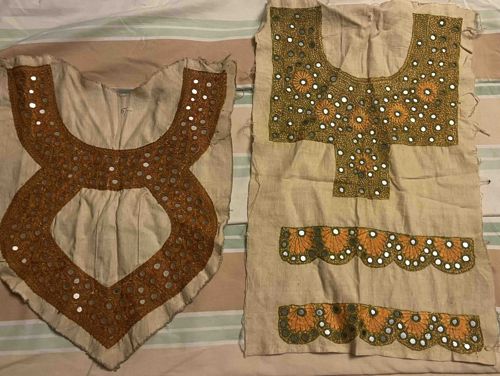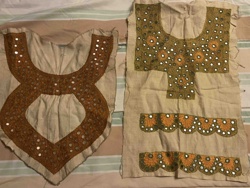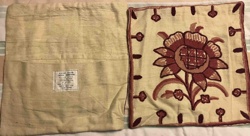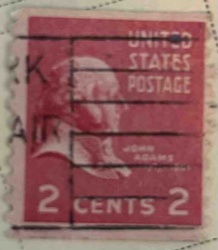
Embroidered Textile Panels with Shisha Mirrors
These are two separate, unfinished textile pieces, likely intended as components for traditional garments, possibly blouses or tunics. Both pieces are made from a natural, undyed, coarse-weave fabric, possibly linen or a cotton-linen blend, exhibiting a light beige or off-white color. The fabric shows some visible creasing and slight discoloration consistent with age and storage, but no major tears or holes are apparent. The edges are raw and unfinished, indicating they are either works in progress or deconstructed elements.
The piece on the left features a distinct, 'U'-shaped neckline design with a broader 'X' or bow-like element extending outwards from the bottom of the 'U'. This entire embroidered section is executed in a rich, dark golden-brown thread, with a dense, textured stitchwork, possibly chain stitch or couching, creating a raised effect. Embedded within this embroidery are numerous small, circular mirrors ('shisha' embroidery), meticulously stitched around their edges with coordinating thread. The mirrors themselves appear round and reflective, showing minor signs of dulling but generally intact. The overall dimensions are difficult to ascertain without a scale, but it appears to be a front panel for an upper body garment.
The piece on the right is rectangular and much larger, depicting multiple embroidered sections. The prominent upper section forms a boat-neck or wide 'U'-neckline shape, extensively decorated with embroidery and shisha mirrors. The embroidery here is in a vibrant golden-yellow and a darker olive-green thread, forming floral or abstract circular motifs with centers often highlighted by mirrors. Surrounding these motifs are numerous smaller mirrors, each individually secured. Below this main neck panel are two horizontal, scalloped border sections, also heavily embroidered with the same golden-yellow and olive-green threads and adorned with mirrors. These borders feature a repeating fan or petal-like design. The stitching throughout both pieces appears to be hand-done, characterized by slight variations in tension and spacing, indicative of artisanal craftsmanship rather than machine production. The quality of the mirror work and embroidery is high, demonstrating considerable skill and patience. There are no discernible maker's marks or signatures. Given the style of embroidery and the use of shisha mirrors, these pieces strongly suggest an origin in South Asia, likely from regions known for traditional needlework such as India, Pakistan, or Afghanistan. They likely date from the mid-to-late 20th century, though an earlier origin is possible depending on specific regional styles.



